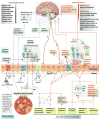The role of microbiome in central nervous system disorders
- PMID: 24370461
- PMCID: PMC4062078
- DOI: 10.1016/j.bbi.2013.12.015
The role of microbiome in central nervous system disorders
Abstract
Mammals live in a co-evolutionary association with the plethora of microorganisms that reside at a variety of tissue microenvironments. The microbiome represents the collective genomes of these co-existing microorganisms, which is shaped by host factors such as genetics and nutrients but in turn is able to influence host biology in health and disease. Niche-specific microbiome, prominently the gut microbiome, has the capacity to effect both local and distal sites within the host. The gut microbiome has played a crucial role in the bidirectional gut-brain axis that integrates the gut and central nervous system (CNS) activities, and thus the concept of microbiome-gut-brain axis is emerging. Studies are revealing how diverse forms of neuro-immune and neuro-psychiatric disorders are correlated with or modulated by variations of microbiome, microbiota-derived products and exogenous antibiotics and probiotics. The microbiome poises the peripheral immune homeostasis and predisposes host susceptibility to CNS autoimmune diseases such as multiple sclerosis. Neural, endocrine and metabolic mechanisms are also critical mediators of the microbiome-CNS signaling, which are more involved in neuro-psychiatric disorders such as autism, depression, anxiety, stress. Research on the role of microbiome in CNS disorders deepens our academic knowledge about host-microbiome commensalism in central regulation and in practicality, holds conceivable promise for developing novel prognostic and therapeutic avenues for CNS disorders.
Keywords: Central nervous system; Gut–brain axis; Microbiome; Neuro-immune disorders; Neuro-psychiatric disorders.
Copyright © 2014 Elsevier Inc. All rights reserved.
Figures

References
-
- Ait-Belgnaoui A, Durand H, Cartier C, Chaumaz G, Eutamene H, Ferrier L, Houdeau E, Fioramonti J, Bueno L, Theodorou V. Prevention of gut leakiness by a probiotic treatment leads to attenuated HPA response to an acute psychological stress in rats. Psychoneuroendocrinology. 2012;37:1885–1895. - PubMed
Publication types
MeSH terms
Grants and funding
LinkOut - more resources
Full Text Sources
Other Literature Sources
Medical

